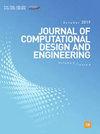面向全局优化问题的基于传热冷凝策略的改进雪消融优化器
IF 6.1
2区 工程技术
Q1 COMPUTER SCIENCE, INTERDISCIPLINARY APPLICATIONS
引用次数: 0
摘要
雪消融优化器(SAO)是2023年4月提出的一种新的元启发式算法。模拟了自然界中雪的升华和融化现象,具有良好的优化效果。《准则》提出了新的双人口机制。通过引入布朗运动来模拟气体分子在空间中的随机运动。然而,随着温度因素的变化,大部分水分子转化为水蒸气。这就打破了探索与开发的平衡,降低了算法后期的优化能力。特别是面对高维问题时,很容易陷入局部最优。为了提高算法的效率,本文提出了一种基于传热冷凝策略的雪消融优化器(SAOHTC)。首先,本文提出了一种传热策略。利用气体分子将热量从高温传递到低温,并将其位置从低温移动到高温。使种群中适应度较低的个体向适应度较高的个体移动,从而提高原算法的优化效率。其次,提出了一种冷凝策略。它可以通过模拟自然界中的冷凝将水蒸气转化为水,改善了原有双种群机制的不足。提高收敛速度。最后,验证了SAOHTC的性能。本文通过IEEE CEC2014和IEEE CEC2017两个基准实验,以及五个工程问题,验证了SAOHTC的优越性能。本文章由计算机程序翻译,如有差异,请以英文原文为准。
Improved Snow Ablation Optimizer with Heat Transfer and Condensation Strategy for Global Optimization Problem
Abstract The Snow Ablation Optimizer (SAO) is a new metaheuristic algorithm proposed in April 2023. It simulates the phenomenon of snow sublimation and melting in nature and has a good optimization effect. The SAO proposes a new two-population mechanism. By introducing Brownian motion to simulate the random motion of gas molecules in space. However, as the temperature factor changes, most water molecules are converted into water vapor. Which breaks the balance between exploration and exploitation, and reduces the optimization ability of the algorithm in the later stage. Especially in the face of high-dimensional problems, it is easy to fall into local optimal. In order to improve the efficiency of the algorithm, this paper proposes an improved Snow Ablation Optimizer with Heat Transfer and Condensation Strategy(SAOHTC). Firstly, this article proposes a heat transfer strategy. Utilizes gas molecules to transfer heat from high to low temperatures and move their positions from low to high temperatures. Causing individuals with lower fitness in the population to move towards individuals with higher fitness, thereby improving the optimization efficiency of the original algorithm. Secondly, a condensation strategy is proposed. Which can transform water vapor into water by simulating condensation in nature, improve the deficiency of the original two-population mechanism. improve the convergence speed. Finally, to verify the performance of SAOHTC. In this paper, two benchmark experiments of IEEE CEC2014 and IEEE CEC2017 and five engineering problems are used to test the superior performance of SAOHTC.
求助全文
通过发布文献求助,成功后即可免费获取论文全文。
去求助
来源期刊

Journal of Computational Design and Engineering
Computer Science-Human-Computer Interaction
CiteScore
7.70
自引率
20.40%
发文量
125
期刊介绍:
Journal of Computational Design and Engineering is an international journal that aims to provide academia and industry with a venue for rapid publication of research papers reporting innovative computational methods and applications to achieve a major breakthrough, practical improvements, and bold new research directions within a wide range of design and engineering:
• Theory and its progress in computational advancement for design and engineering
• Development of computational framework to support large scale design and engineering
• Interaction issues among human, designed artifacts, and systems
• Knowledge-intensive technologies for intelligent and sustainable systems
• Emerging technology and convergence of technology fields presented with convincing design examples
• Educational issues for academia, practitioners, and future generation
• Proposal on new research directions as well as survey and retrospectives on mature field.
 求助内容:
求助内容: 应助结果提醒方式:
应助结果提醒方式:


